

Linking Brain Research with Access, Equity, and Inclusion. Six Metacognitive Strategies and How to Use them with Popular Online Tools – Education Development Courses. Adapted from Troika and ConnectEd Blog In recent years the area of education has tried to combine some elements of cognitive sciences, such as psychology and neuroscience, with classroom practice.
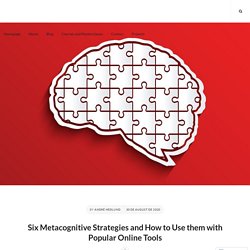
Several postgraduate courses, conferences, workshops as well as other events are now part of Continuous Professional Development (CPD) programs and they’re likely to take into account topics associated with Neuroeducation, Science of Learning (SoL) and the science of the Mind, Brain and Education (MBE). I’m a Neuroscientist. Here’s How Teachers Change Kids’ Brains. Teachers change brains.
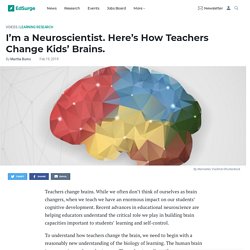
While we often don’t think of ourselves as brain changers, when we teach we have an enormous impact on our students’ cognitive development. Recent advances in educational neuroscience are helping educators understand the critical role we play in building brain capacities important to students’ learning and self-control. To understand how teachers change the brain, we need to begin with a reasonably new understanding of the biology of learning. The human brain is an experience-dependent organ. Throughout our lives, the cerebrum—the largest portion of our brain—fine-tunes itself to adapt to the world around us. How the Brain Learns Best. Mind, Brain and Education: ..empowering EAL/D teachers. Learning to Learn: On the Science of Memory and Effective Learning - Mark Koester. One of the most useful and interesting things I learned in the last year was not so much a specific subject or skill but a meta-skill.
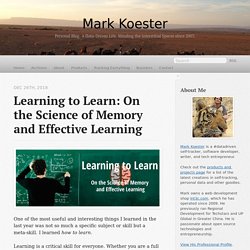
I learned how to learn. Learning is a critical skill for everyone. Whether you are a full time student, working full-time or retired, learning is an important aspect for people living in a constantly changing and complex world today. Working Memory: A Complete Guide to How Your Brain Processes Information, Thinks and Learns. JALT Mind, Brain, and Education SIG - Publications: Think Tanks. JALT Mind, Brain, and Education SIG - Publications: Journal. DIY Neuro-ELT - HelgesenHandouts. Want free downloads? We've got 'em! — Retrieval Practice.org. Ask the Cognitive Scientist. The Cognitive Science of Education (14-Part Series) Brain Facts Book Form. The 6 Principles of Mind-Brain-Education - ITSI. Throughout the centuries, great teachers have been guided by their intuition as to what method of teaching works best.
Modern brain imaging techniques have brought into plain view why certain methods work as the workings of the brain has never been as thoroughly demonstrated. Today we have a clear understanding of which methods work. The latest research in the science of Mind, Brain and Education (MBE) are available to help 21st Century teachers and learners achieve success.
MBE is a young science started at Harvard University 25 years ago by uniting the fields of neuroscience, psychology, and education. Here are the 6 principles MBE is based on: 1. Our brains are as unique as our faces or our fingerprints. Each human being has unique DNA. Humans share general physical and neurodevelopmental stages (yet not in the same way or at the same rate) that establish the parameters for learning. 2. Evidence Based EFL: Left brains and right brains in English language teaching. If you've seen my IATEFL talk, you'll know that someone asked why I didn't include 'left brained/right brained' teaching.
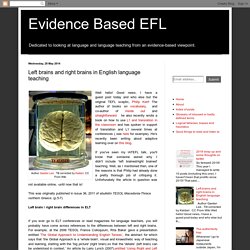
Well, as I mentioned then, one of the reasons is that Philip had already done a pretty thorough job of critiquing it. Unfortunately the article in question was not available online, -until now that is! Left brain / right brain differences in If you ever go to conferences or read magazines for language teachers, you will probably have come across references to the differences between left and right brains. For example, at the 2006 TESOL France Colloquium, Rita Baker gave a presentation entitled ‘The Global Approach to Understanding English Tenses’, the abstract for which says that ‘the Global Approach is a 'whole brain', visual and kinaesthetic way of teaching and learning, starting with the 'big picture' (right brain) so that the 'details' (left brain) can be understood in context.’ Mts made to stick model. Retrieval Cues and Retrieval of Memories Source: Boundless. “Retrieval Cues and Retrieval of Memories.” – jenniewatters123. The benefits of retrieval practice in learning – The Education Hub.
Retrieval practice is a strategy to rehearse already learned information by trying to retrieve it from memory: to locate the piece of information in your mind.
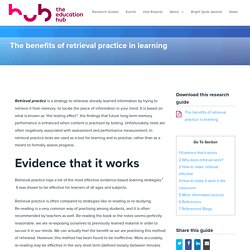
15 myths about memory and learning. Myth 7 Performance is always a sign of learning.
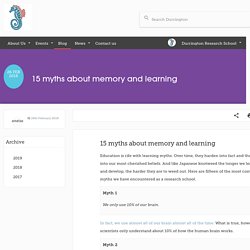
Learning involves the transfer of material from working memory to long-term memory. A student’s performance in a lesson – for example, answering a question correctly – is no guarantee that they will still know – or be able to apply – this information in a fortnight’s time. These revision strategies have been shown to be the most popular amongst students. Unfortunately, they are also very ineffective. The Cognitive Science of Education (14-Part Series) Exploring Retrieval Practice with Younger Students. Tricia Taylor is a former teacher and lead practitioner in schools in London, UK and Brooklyn.
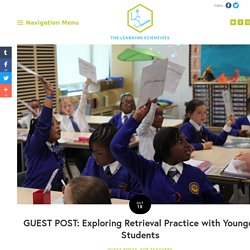
With 20 years of experience in both primary and secondary schools, Tricia founded TailoredPractice and now partners with schools to use mind, brain and education research to both improve teaching and learning and create a climate and culture around perseverance and challenge. Tricia is also an Associate Lecturer for English at Goldsmith’s University teacher training program in London and Education Consultant for PowerTools, based in New York City. In this article, Tricia writes about Dunraven School in London, where she worked for many years as Lead Practitioner. Tricia tweets at @TriciaTailored and blogs occasionally at www.tailoredpractice.com/blog.
More about Tricia and TailoredPractice can be found at tailoredpractice.com. The Case for Starting Young What if the students were learning these habits at a younger age? Spaced Practice – The Education Hub. Most people agree that to master a skill we need to practise.
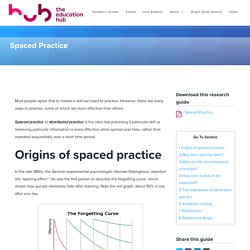
However, there are many ways to practise, some of which are more effective than others. Spaced practice or distributed practice is the idea that practising a particular skill or retrieving particular information is more effective when spread over time, rather than repeated sequentially over a short time period. DIY Neuro-ELT - HelgesenHandouts. Cognitive Load Theory and its application in the classroom. What is retrieval practice? — Retrieval Practice.org.
When we think about learning, we typically focus on getting information into students’ heads. Teachers might lecture, show videos, encourage note taking, and/or provide review sheets. Students often study by re-reading their textbooks, highlighting information, and/or reviewing their notes. In both of these situations, the focus is on getting information “in,” with the hope that it sticks. We’ve all had the experience of feeling like these methods work – if I cram, and re-read, and study my notes, I feel fairly confident that I know the information. And indeed, cramming pays off – we tend to do well on a test. The problem is that these methods only lead to short-term learning. Much to our surprise, however, memory researchers have demonstrated that the opposite is true: when information comes to mind easily and feels fluent, it’s easy to forget. Brain-Friendly Teaching:Putting Brain-Friendly Strategies to Work.
Research & Publications — Pooja K. Agarwal, Ph.D. Peer-Reviewed Journal Articles Agarwal, P.
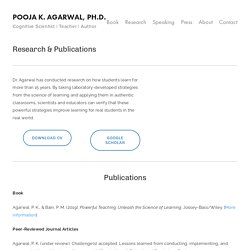
K.